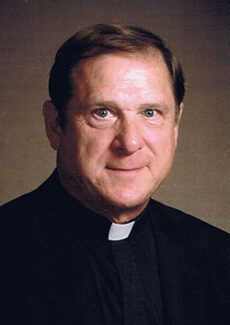St. Peter’s Resurrection proclamation should inspire hope and joy, not hatred

Father R. Michael Schaab
By Father R. Michael Schaab
Third Sunday of Easter/April 26
Acts 2:14,22-33; Psalm 16:1-2,4,7-8,9-10,11; 1 Peter 1:17-21; Luke 24:13-35
There is a pandemic that the world currently struggles against, and I’m not referring to COVID-19. It is a pandemic of rising discrimination and bigotry against Jews. Its name is “antisemitism.”
The first reading today is from the Acts of the Apostles and preserves for us the sermon of St. Peter as he proclaimed the resurrection of Christ to “you who are Jews, indeed all of you staying in Jerusalem.” In it Peter states, “This man (Jesus), delivered up by the set plan and foreknowledge of God, you killed, using lawless men to crucify him.” Down through the ages, and unfortunately even in our own day, these words of Peter have been used to justify hostility, and even outright violence, toward Jews.
It’s important to recall some other words as we hear Peter preach. Those are the words spoken in 1965 by the Second Vatican Council in the shortest document it produced. That was “Nostra Aetate,” the “Declaration on the Relation of the Church to Non-Christian Religions.” It’s only three pages long, but it made it abundantly clear that Peter’s sermon in no way condones antisemitism. It said, “True, the Jewish authorities and those who followed their lead pressed for the death of Christ; still, what happened in His passion cannot be charged against all the Jews, without distinction, then alive, nor against the Jews of today.” Furthermore, it went on to condemn “any discrimination against (people) or harassment of them because of their race, color, condition in life, or religion.”
OPENING SCRIPTURE, BREAKING BREAD
So if antisemitism was not what Peter was talking about, what was his message? To understand that, it’s important to realize that about 25 percent of his sermon is quoted from Psalm 16. Then it becomes clear that Peter is telling the people they are to be filled with hope and joy as they accept the Resurrection of Jesus and recognize His presence in their midst. And that’s the same thought we express in the Responsorial Psalm as we say, “You will show me the path to life, abounding joy in your presence.”
The Gospel for the day is from Luke and is about the disciples (two men, or a lady and gentleman) on their way to Emmaus. Remember, Peter was speaking to the people of Jerusalem telling them they should be joyful because the Lord was present. But they had not seen him in person since the Resurrection. The two disciples provide an answer to their unasked question, “How can we be sure of the presence of Christ so we can really be filled with joy?”
Ultimately, the presence of Christ is discovered in the Word and in the breaking of the bread. If there ever was a reason for daily Scripture reading and reflection it is expressed by these travelers when they say, “Were not our hearts burning within us while he spoke to us on the way and opened the Scriptures to us?”
And if we ever ask ourselves why we bother to go to Church on Sunday, all we need is to listen to their testimony “that he was made known to them in the breaking of the bread.” The experience of these two disciples is the answer to that nagging question all believers have, “How can we be sure of the presence of Christ. . . ?”
“HE IS RISEN!”
The Church reminds us of all this every time we use one of the “Four Eucharistic Prayers for Special Needs or Occasions.” Each of them uses these same words after the Holy, Holy, Holy: “You are indeed Holy and to be glorified, O God, who love the human race and who always walk with us on the journey of life. Blessed indeed is your Son, present in our midst when we are gathered by his love, and when, as once for his disciples, so now for us, he opens the Scriptures and breaks the bread.” He was present to the first generation of Christians in Jerusalem and he is present to us today in Word and Eucharist.
And if you’re looking for still another way the Church keeps the spirit of the Emmaus-bound disciples alive, remember the words that greeted them as they returned to Jerusalem “where they found gathered together the eleven and those with them who were saying, ‘The Lord has truly been raised and has appeared to Simon!’” The Eastern Churches keep alive a traditional greeting: “He is risen!” And the response is: “He is truly risen!”
It’s a little thing, one might say, but it’s a beautiful expression of another teaching by Peter, found in today’s second reading. He tells us to “believe in God who raised him from the dead and gave him glory, so that your faith and hope are in God.” All the faith and hope in the world are summed up in those few words, “He is risen!”
—
Father R. Michael Schaab is a senior priest of the Diocese of Peoria who gives retreats and days of recollection, and who fills in as presider at parish Masses on weekends. He resides on a hobby farm in Putnam County.





